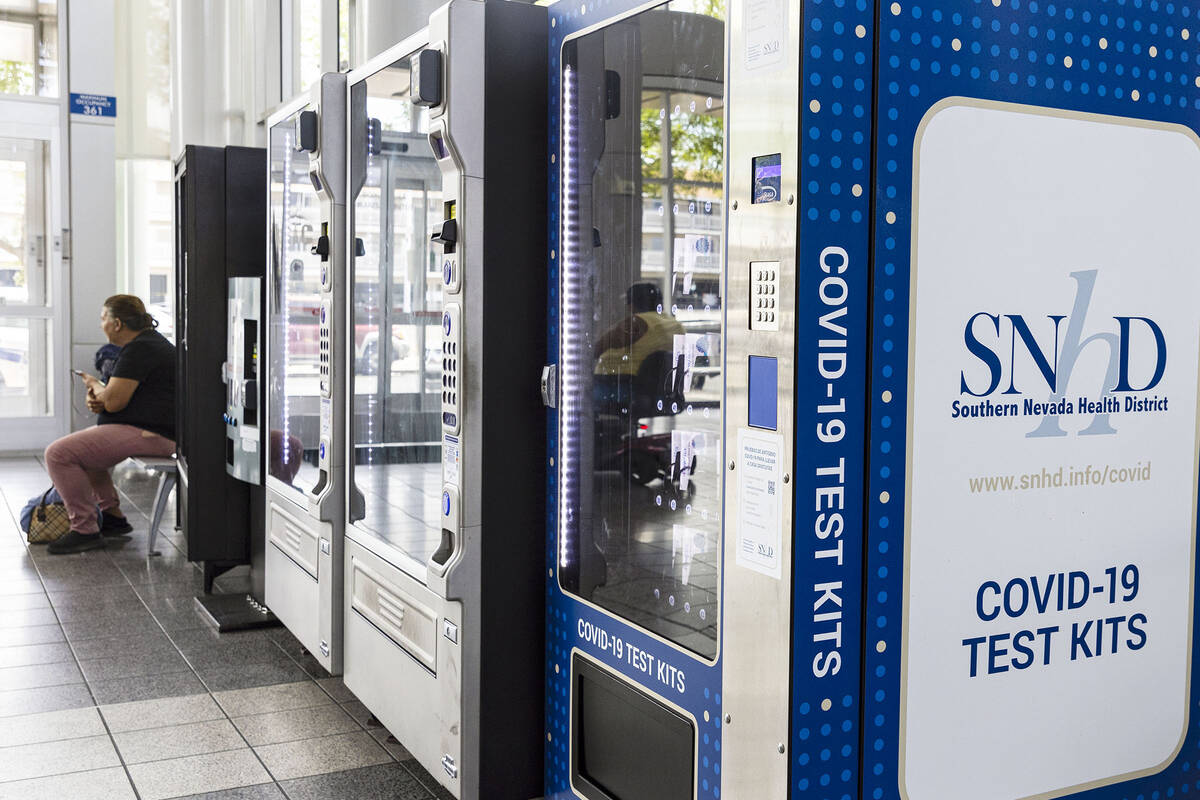Free COVID vaccinations, treatments continue as emergency ends
Although the COVID-19 public health emergency has ended, the Southern Nevada Health District will continue to provide free vaccinations, tests and treatments for the near future, officials emphasized Thursday.
The end of the emergency does not mean an “end to our commitment to provide services to protect this community from COVID-19 infection,” district health officer Dr. Fermin Leguen said during an online media briefing.
Testing changes
The health district will discontinue the testing clinic at its main office after July 31. However, free PCR testing will continue to be offered through March 2024 at clinics on College of Southern Nevada’s Charleston and Cheyenne campuses, said Cassius Lockett, the district’s director of disease surveillance and control.
Free COVID-19 antigen at-home tests will continue to be offered through a health district vending machine program. The machines are located at the RTC Bonneville Transit Center and South Strip Transit Terminal, East Las Vegas Community Center, Fremont Public Health Center, Mesa View Regional Hospital in Mesquite and the Regional Government Center in Laughlin.
The requirement for private insurance companies to cover COVID-19 tests without cost sharing — both over-the-counter tests and laboratory tests — concluded with the end of the emergency on Thursday, according to the U.S. Department of Health and Human Services.
Medicare beneficiaries enrolled in Part B will continue to have coverage without cost sharing for laboratory COVID-19 tests when ordered by a provider. However, there will be out-of-pocket costs for over-the-counter tests.
State Medicaid programs must provide coverage without cost sharing for COVID-19 testing through September 2024, after which coverage may vary by state.
The federal Increasing Access to Community Testing program will continue to provide free COVID-19 testing for uninsured people at Walgreens, CVS and Quest facilities, Lockett said. “However, the footprint is shrinking over time,” he said.
COVID-19 continues to cause hospitalizations and deaths, and Lockett urged community members to get tested if they have symptoms or have been in contact with a person with the illness.
Vaccines and treatments
For now, COVID-19 vaccines continue to be free at health district clinic locations, said Dr. Cort Lohff, the district’s chief medical officer. “Making vaccinations as accessible as possible is an ongoing priority for us,” he said.
When the federally purchased supply is gone, vaccines will still be available through public and private insurance. The Nevada Department of Health and Human Services estimated that the federal supply could be depleted by late summer of early fall.
Many Americans will continue to pay zero out-of-pocket for COVID-19 vaccines, according to the federal health department. Vaccines recommended by the Advisory Committee on Immunization Practices are a preventive health service under most private plans and will be fully covered without a co-pay.
COVID-19 vaccinations are currently covered under Medicare Part B without a co-pay or cost sharing, and this will continue.
Medicaid will continue to cover all COVID-19 vaccinations without a co-pay or cost sharing through September 2024, and will cover what the immunization advisory committee recommends after that.
The health district will continue to provide free COVID-19 vaccinations to the uninsured. “As always, the health district remains the safety net for those who otherwise lack access to vaccination,” Lohff said.
Antiviral treatments for COVID-19 also will continue to be free for now through the health district, he said.
Surveillance
The health district will continue to monitor the spread of disease in the community by assessing COVID-19 hospitalization data, Lockett said. Death data will continue to be used to assess the severity of disease in the community.
The district eventually will discontinue tracking numbers of cases identified through PCR testing and stop tracking test positivity rates. These metrics no longer accurately reflect levels of diseases in the community, Lockett said, because of the increased use of antigen self-tests whose results aren’t reported.
The district will use hospital emergency department data as an early warning system for disease trends and continue to use wastewater surveillance to track new and emerging variants of the virus, he said.
Contact Mary Hynes at mhynes@reviewjournal.com or 702-383-0336. Follow @MaryHynes1 on Twitter.























